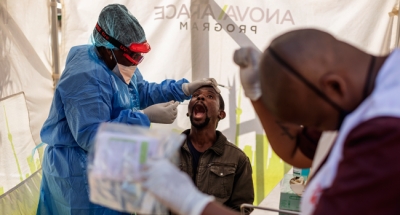Mmsh350
IT Specialist : Am A Successful IT Professional With Expertise In Full Stack Web Development.
Wants to meet Career Partners : Goal Achievers
Articles
189
Followers
44
profile/5736download.png
Mmsh350

Life Returning To Normal In Nigeria, SA, Others As COVID-19 Fears Linger
~3.5 mins read
“Things are getting back to normal, even though it will never be like it was before,†says a relieved Petunia Maseko, relaxing in a bar in South Africa’s Soweto township.
Africa has weathered the coronavirus pandemic relatively well in terms of infections and deaths, though its economies have been badly ravaged.
While many nations ease their COVID-19 measures and citizens dare to breathe a little easier, experts are warning against letting the continent’s success lapse into complacency.
There was plenty of celebrating at The Black and White Lifestyle Pub in Soweto on Friday as the first weekend of spring coincided with South Africa’s transition to its lowest level of lockdown.
The continent’s hardest-hit nation, South Africa has reeled under one of the world’s strictest lockdowns.
“It was tough staying in for six months without socialising,†said Maseko, a 21-year-old engineering student wearing a brightly coloured Ndebele traditional outfit.
But virus measures were followed, with masked revellers getting their temperatures checked at the bar’s entrance.
Sanitising gel in hand, 26-year-old DJ Tiisetso Tenyane was delighted to finally play in front of a live audience after months of live-streaming shows.
“I’ve been craving to play for the people again,†he said.
He said that face masks are “the only sign left that there ever was a pandemicâ€.
On the rest of the African continent, daily life varies vastly between strict observance of health measures and total relaxation.
– ‘Back to our habits’ –
“We don’t care about corona,†Ivory Coast’s President Alassane Ouattara said, oblivious to listening microphones, when he kissed a party official last month in front of thousands of people in clear defiance of virus restrictions.
Although masks are still compulsory, that rule is “not respected anywhere or almost anywhere†in Ivory Coast, a health worker said on condition of anonymity.
“The hysteria is gone and the state no longer communicates much about the subjectâ€.
In DR Congo’s capital Kinshasa, taking temperatures and washing hands are still the norm in the residential district of Gombe, which is also the city’s diplomatic and economic centre.
But in working-class communities, masks are being pushed down to the chin and people are shaking hands again.
For many the latest buzz phrase is “corona eza teâ€, which translates to “there is no corona†in the local Lingala.
In West African’s Burkina Faso, 43-year-old fish seller Ousmane Ouedraogo said he can’t wear a mask forever.
“We tried to wear it every day but it was the authorities who set the example by acting as if the disease was over. So we’re going back to our habits,†he said.
Nobody uses the hand-washing station at the entrance to Guillaume Traore’s restaurant in Burkina’s capital Ouagadougou.
“When you remind a customer, he tells you that the coronavirus does not exist,†he said.
In Chad and Gabon, many wear masks low down, covering only the mouth or just the chin, only to hastily lift them up when they come across the police.
In churches, mosques and markets, people jostle into each other. In the evening, however, a strict curfew remains in place.
– ‘Be very careful’ –
In the megacity Lagos of Africa’s most populous country Nigeria, civil servant Isiaka Okesanya said he now regularly forgets to wear his mask.
“It’s like God has helped us to get rid of the disease. We no longer read about those big figures of deaths,†the 41-year-old told AFP.
But Emmanuel Akinyemi, director of Lagos-based Estate Clinic, said that “coronavirus is real and is still very much around usâ€.
Health Minister Osagie Ehanire said last week that while Nigeria’s daily infection figures have been trending downwards, “we, unfortunately, cannot afford to rejoice or speak of successâ€.
The World Health Organization’s Africa regional director Matshidiso Moeti said the continent has been spared “an exponential spread of Covid-19 as many initially fearedâ€.
However, John Nkengasong, director of Africa Centres for Disease Control and Prevention, warned that “we also have to be very careful that we do not over-project any successesâ€.
In West Africa’s Senegal, life has almost returned to normal since June.
This is in stark contrast to Rwanda, where one of the strictest lockdowns is still in place and police make arrests for “not wearing masks properlyâ€.
In northern Africa, Morocco remains in lockdown, especially economic capital Casablanca, where large neighbourhoods are tightly sealed off.
Eastern Africa’s Kenya is meanwhile reopening its bars and allowing restaurants to sell alcohol again as infections drop.
“We are the most vulnerable and fragile at the moment where we think we have won,†President Uhuru Kenyatta said on Monday.
“If we have won one battle against Covid-19, we have not yet won the war.â€
profile/5736download.png
Mmsh350

NABTEB Releases NBC/NTC Examinations Date
~1.6 mins read
Advertisement

Link socials
Matches
Loading...
